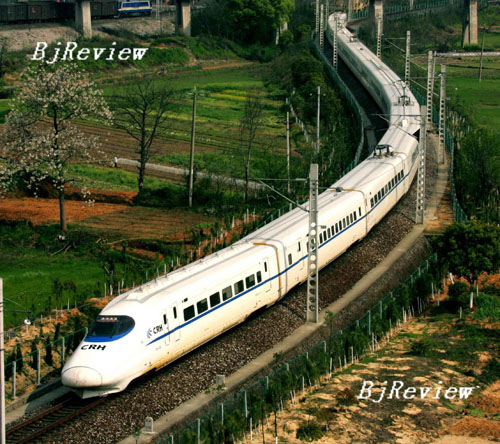
FAST TRACKING RAIL SERVICE
A homemade CRH bullet passenger train slices through the countryside from Nanchang, central China’s Jiangxi Province, to Hangzhou, eastern Zhejiang Province, on April 18.
The sixth nationwide “speed increase” of China’s railways has been completed in a bid to improve overall transportation capacity. The recent initiative not only saves time for demanding travelers, but also highly improves China’s cargo transportation capacity to meet the needs of rapid economic development.
According to the Ministry of Railways, the railway speed limit will be raised up to between 200-250 km per hour in most parts of the country, 20-30 percent faster than previously.
(Inset) Train enthusiasts from Tianjin pose for a group picture before departing for Beijing aboard a bullet train.
SOCIETY
One million vehicles to be banned
More than 1 million automobiles will be banned from driving in Beijing during the Olympic Games in 2008 to reduce traffic congestion and improve air quality.
Liu Xiaoming, Vice Director of the Beijing Municipal Transportation Committee, said that the ban is expected to reduce the number of vehicles in Beijing by 20 percent to 30 percent during the Games.
Vehicles belonging to government departments and state-owned enterprises will have restricted access to Beijing's downtown and citizens will be encouraged to reduce the use of private cars, Liu said. Heavy polluting trucks will be banned.
During the games a free bus service will be available for athletes, spectators, games' volunteers and workers, said Liu.
Statistics show that the number of newly registered automobiles in Beijing is growing by 1,060 a day. There are currently 2.97 million automobiles in the city. That number is expected to exceed 3.3 million by the time the Olympic Games begin in August 2008.
Policemen get closer
China will send 85 percent of office-bound police officers to work in the community in order to better serve the public and resolve social conflicts faster, according to the Ministry of Public Security.
The move will enable the police to react more quickly to crime, Liu Jinguo, Vice Minister of Public Security said at a recent meeting on the management of public security.
Since 2006, China has sent more than 80,000 police to work in urban communities and rural villages to maintain social order and fight crime.
Liu said the logistics department of the ministry will equip the police with more advanced transportation and telecommunications facilities and improve their working conditions.
Academicians banned on commercial ads
With their contributions to the progress of science and technology, academicians can be deeply influential with the public, according to Bai Chunli, Vice President of the Chinese Academy of Sciences (CAS).
But, a CAS media officer told Xinhua, China's official news agency, some academicians have been involved in commercial activities that bear little relation to their research fields.
Businesses have exploited the prestige of academicians to expand their commercial activities, attract customers, and gain commercial advantages, said the officer.
Academicians have performed as "image ambassadors" in certain commercial activities and allowed their names to be used in endorsements, he added.
In 2001, the CAS issued a code of conduct, requiring academicians to honor and protect their reputations and to stem corrupt and illegal behavior in scientific fields.
Academicians are forbidden to participate in any activities seeking profits improperly, according to the rules. The ban on participating in commercial advertisements is in line with the requirement of the rules, Bai said.
Panda migration
Hong Kong's Ocean Park and the Chinese mainland's Wolong Nature Reserve Administration have finalized arrangements to send two new giant pandas to Hong Kong, a government press release said April 16.
Secretary for Home Affairs Patrick Ho and the State Forestry Administration's Zhao Xuemin witnessed the agreement signing in Beijing. It stipulates that after the pandas arrive, the park should only present them to the public once they are physically fit.
The agreement also establishes working relations between the park and the reserve on panda nursing, breeding and research.
The pandas will arrive in Hong Kong by the end of April, and there will be a handover ceremony, the press said.
The results of the "Name the Giant Pandas" activity will also be announced that day and the pair will be officially named. About 13,000 entries have been received.
| 